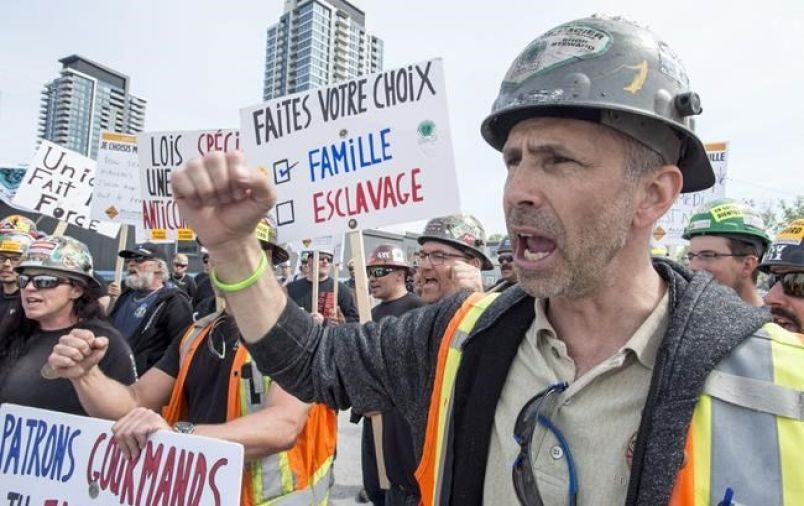 After a week of the strike, the Québec Liberals legislated the workers back to work. Engineers employed by the province also had been on strike for three weeks.
After a week of the strike, the Québec Liberals legislated the workers back to work. Engineers employed by the province also had been on strike for three weeks.
An open-ended general strike all across Québec began in the construction industry on Wednesday. The main issues in the dispute are about work schedules and overtime. Workers oppose the bosses’ demand to return to work, on request, at the end of the week at a flat rate of pay, in addition to having to be available for five to twenty hours per day. This is a direct attack on working conditions and the family life of construction workers.
Negotiations
From 16 May, the Trade Union Alliance of Construction, organising 175,000 workers from the various construction industry unions, announced that if an agreement was not reached by 24 May, the strike would be triggered.
Yet, the employers’ associations did everything they could to stretch the negotiations and corner the union side in order to force them to take strike action. It should be noted that in the construction sector, it is forbidden to negotiate ‘retroactivity’ (in retrospect), a measure which systematically favours the bosses, only gaining as the days of talks pass.
Moreover, the importance of the construction industry in Québec ‘s economy makes it a crucial and highly political matter. For the Couillard pro-business government, it is “unacceptable” for a strike to paralyze Québec. The threat of a special law threatened by the government to force a return to work weighed on the striking workers. No consideration whatsoever for the legitimate demands of the strikers! What are unacceptable are the demands of the bosses, who ask the workers to sacrifice their living conditions and their families!
It should also be remembered that on May 11, the Trade Union Alliance of Construction issued a petition of more than 40,000 names to the Minister of Labor in order to negotiate the issue of ‘retroactivity’, which would put an end to the advantage of the ACQ (Association de la Construction du Québec, the bosses’ association) in its deliberate strategy of extending the negotiations. The government’s reaction? Nothing. This just shows the pro-management bias of the Couillard government.
The worst episode of the bargaining round came when the ACQ tried to slander the trade unions by claiming that it was them who had tried to slow down the negotiations and that the only thing they wanted was to go on strike. It is these sorts of lies that are dominant in the media, repeatedly claiming that population is “taken hostage” and “does not want this strike…”
But the strike is a last resort and it is absolutely necessary in the present situation.
The first day of open-ended general strike
In the construction sector, it is still legally possible for the employers to hire strike-breakers. So for the strike to be fully respected requires strong mobilization and solidarity among the strikers, who sometimes have to confront their colleagues who are manipulated by the bosses.
The construction bosses have not wasted any time. In some localities, they are inviting their employees to rooms for face-to-face talks in which they pretend that “there is no strike”, that the worker “can go to work” etc. Some bosses went as far as to threaten dismissal for those who are going on strike. Even the media have rushed to remind people that “during a strike, one can go to work”. Above all, people have the right to support the strike and to defend themselves against the bosses. With strike orders adopted at around 95% throughout the country, the opinion of such right-wing media can be dispensed with. This strike is legitimate and the right to strike should be respected!
The first day of the strike was spent with union representatives’ tours on the construction sites to ensure respect for the walkout. A few isolated clashes with bosses or with some workers have taken place, but overall the lines of the strike were firmly held and the big construction sites in Montreal, such as the CHUM or the Champlain Bridge, were totally stopped.
The top of the political class did not wait to show its true face. Québec City mayor Régis Labeaume declared yesterday that he would welcome a special law. Two years ago there was an attempt to impose law 10 against municipal workers, and now they want to impose another one against construction workers. The government has, for its part, reiterated its willingness to impose a special law. In short, elected officials handsomely paid with our taxes, are pushing for measures aimed at bringing us back into obedience.
The labour and management parties were called yesterday in Québec City to resolve the dispute, and we will see what will come out of this. However, we should not be deceived: the strike remains the best way to counter the regression planned in the next convention.
The need for a political representation for the working class
The pro-capitalist bias of the government and the laws allowing strike-breakers show once again the need for the working class to get involved in politics. We have to push for our own candidates from the trade union movement into the National Assembly -as well as on the municipal and the federal levels- to reverse the policies and laws against workers.
Better working conditions have been built on past struggles. In 2017, a renewed struggle is on the agenda to protect ourselves against the greed of the bosses and the contempt of the government.
Solidarity with the strikers!
Defiance against the special law!
For workers and union candidates in the elections!


